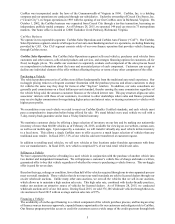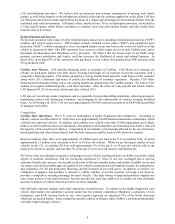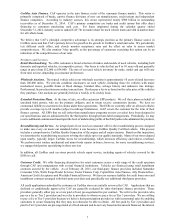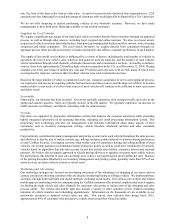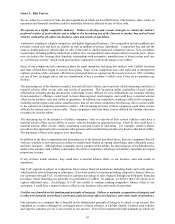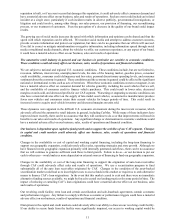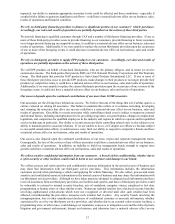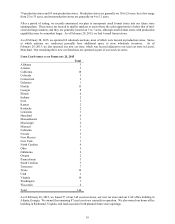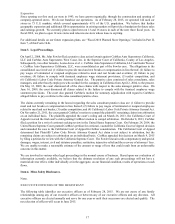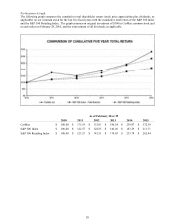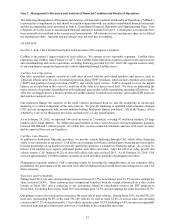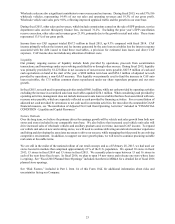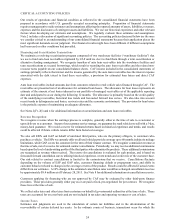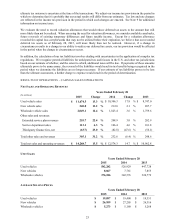CarMax 2015 Annual Report Download - page 19
Download and view the complete annual report
Please find page 19 of the 2015 CarMax annual report below. You can navigate through the pages in the report by either clicking on the pages listed below, or by using the keyword search tool below to find specific information within the annual report.15
Our business is sensitive to conditions affecting automotive manufacturers, including manufacturer recalls.
Adverse conditions affecting one or more automotive manufacturers could have a material adverse effect on our sales
and results of operations and could impact the supply of vehicles, including the supply of late-model used vehicles.
In addition, manufacturer recalls are a common occurrence that have recently accelerated in frequency and scope.
Recalls could adversely affect used vehicle sales or valuations, could cause us to temporarily remove vehicles from
inventory, could force us to incur increased costs and could expose us to litigation and adverse publicity related to the
sale of recalled vehicles, which could have a material adverse effect on our business, sales and results of operations.
Our results of operations and financial condition are subject to management’s accounting judgments and
estimates, as well as changes in accounting policies.
The preparation of our financial statements requires us to make estimates and assumptions affecting the reported
amounts of CarMax’s assets, liabilities, revenues, expenses and earnings. If these estimates or assumptions are
incorrect, it could have a material adverse effect on our results of operations or financial condition. We have identified
several accounting policies as being “critical” to the fair presentation of our financial condition and results of
operations because they involve major aspects of our business and require us to make judgments about matters that
are inherently uncertain. These policies are described in Item 7. Management’s Discussion and Analysis of Financial
Condition and Results of Operations, and the notes to consolidated financial statements included in Item 8.
The implementation of new accounting requirements or other changes to U.S. generally accepted accounting principles
could have a material adverse effect on our reported results of operations and financial condition.
Our business is subject to seasonal fluctuations.
Our business is subject to seasonal fluctuations. We generally realize a higher proportion of revenue and operating
profit during the first and second fiscal quarters. If conditions arise that impair vehicle sales during the first or second
fiscal quarters, these conditions could have a disproportionately large adverse effect on our annual results of
operations.
Our business is sensitive to weather events.
The occurrence of severe weather events, such as rain, snow, wind, storms, hurricanes, extended periods of unusually
cold weather or natural disasters, could cause store closures or affect the timing of consumer demand, either of which
could adversely affect consumer traffic and could have a material adverse effect on our sales and results of operations
in a given period.
We are subject to local conditions in the geographic areas in which we are concentrated.
Our performance is subject to local economic, competitive and other conditions prevailing in geographic areas where
we operate. Since a large portion of our sales is generated in the Southeastern U.S., including Florida, and in Texas,
Southern California and Washington, D.C./Baltimore, our results of operations depend substantially on general
economic conditions and consumer spending habits in these markets. In the event that any of these geographic areas
experienced a downturn in economic conditions, it could have a material adverse effect on our business, sales and
results of operations.
Item 1B. Unresolved Staff Comments.
None.
Item 2. Properties.
We conduct our retail vehicle operations in two basic formats – production and non-production stores. Production
stores are those locations at which vehicle reconditioning is performed. Production stores have more service bays and
require additional space for work-in-process inventory and, therefore, are generally larger than non-production stores.
In determining whether to construct a production or a non-production store on a given site, we take several factors
into account, including the anticipated long-term regional reconditioning needs and the available acreage of the sites
in that market. As a result, some stores that are constructed to accommodate reconditioning activities may initially be
operated as non-production stores until we expand our presence in that market. As of February 28, 2015, we operated


